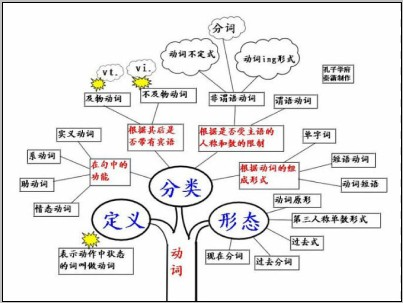本试题 “Being afraid of making mistakes, the little boy _____ answer his teacher's question.A. does dareB. doesn't dareC. daren't toD. not dare to” 主要考查您对动词
一般现在时
等考点的理解。关于这些考点您可以点击下面的选项卡查看详细档案。
- 动词
- 一般现在时
动词的定义:
表示动作中状态的词叫做动词。根据其在句中的功能,动词可分为行为动词、系动词、助动词和情态动词四类,有些动词是兼类词。
例如:We have lunch at 12. (have是行为动词)
We have been to NewYork. (have是助动词)
I am hungry. (am是系动词)
You need not have waited for me. (need是情态动词)
The door needs painting. (need是兼类词)
动词的分类:
1)表示动作中状态的词叫做动词。
2)根据其在句中的功能,动词可分为四类,分别是:
实义动词(Notional Verb)、系动词(Link Verb)、助动词(Auxiliary Verb)、情态动词(Modal Verb)。
说明:有些情况下,有些动词是兼类词。
例如:We are having a meeting. 我们正在开会。(having是实义动词。)
He has gone to NewYork.他已去纽约。(has是助动词。)
3)动词根据其后是否带有宾语,可分为两类,分别是:
及物动词(Transitive Verb)、不及物动词(Intransitive Verb),缩写形式分别为vt.和vi.。
说明:同一动词有时可用作及物动词,有时可用作不及物动词。
例如:She can dance and sing. 她能唱歌又能跳舞。(sing在此用作不及物动词。)
She can sing many English songs. 她能唱好多首英文歌曲。(sing用作及物动词。)
4)根据是否受主语的人称和数的限制,可分两类,分别是:
限定动词(Finite Verb)、非限定动词(Non-finite Verb)。
例如:She sings very well. 她唱得很好。(sing受主语she的限制,故用第三人称单数形式sings。)
She wants to learn English well. 她想学好英语。(to learn不受主语she的限制,没有词形变化,是非限定动词。
说明:英语中共有三种非限定动词,分别是:动词不定式(Infinitive)、动名词(Gerund)、分词(Participle)。
5)根据动词的组成形式,可分为三类,分别是:
单字词(One-Word Verb)、短语动词(Phrasal Verb)、动词短语(Verbal Phrase)
例如:The English language contains many phrasal verbs and verbal phrases. 英语里有许多短语动词和动词短语。(contains是单字动词。)
Students should learn to look up new words in dictionaries. 学生们学会查字典。(look up是短语动词。)
The young ought to take care of the old. 年轻人应照料老人。(takecareof是动词短语。)
6)动词有五种形态,分别是:
原形(OriginalForm)、第三人称单数形式(Singular From in Third Personal)、过去式(Past Form)、过去分词(Past Participle)、现在分词(Present Participle)。
动词知识体系:

一般现在时的概念:
表示通常性、规律性、习惯性的状态或者动作(有时间规律发生的事件)的一种时间状态。
一般现在时的用法:
1)经常性或习惯性的动作,常与表示频度的时间状语连用。常用的时间状语有every...,sometimes,at...,on Sunday等。
例如:I leave home for school at 7 every morning. 每天早上我七点离开家。
2)客观真理,客观存在,科学事实。
例如:The earth moves around the sun. 地球绕太阳转动。
Shang hai lies in the east of China. 上海位于中国东部。
3)表示格言或警句。
例如:Pride goes before a fall. 骄者必败。
注意:此用法如果出现在宾语从句中,即使主句是过去时,从句谓语也要用一般现在时。
例如:Columbus proved that the earth is round. 哥伦布证实了地球是圆的。
4)现在时刻的状态、能力、性格、个性。
例如:I don't want so much. 我不要那么多。
Ann writes good English but does not speak well. 安英语写得不错,讲的可不行。
比较:Now I put the sugar in the cup. 把糖放入杯子。
I am doing my homework now. 我正在做功课。
第一句用一般现在时,用于操作演示或指导说明的示范性动作,表示言行的瞬间动作。
第二句中的now是进行时的标志,表示正在进行的动作的客观状况,所以后句用一般现在时。
一般现在时知识体系:

一般现在时用法拓展:
1、一般现在时表将来:
1)下列动词come, go, arrive, leave, start, begin, return的一般现在时可以表示将来,主要用来表示在时间上已确定或安排好的事情。
例如:The train leaves at six tomorrow morning. 火车明天上午六点开。
—When does the bus star? 汽车什么时候开
—It stars in ten minutes. ?十分钟后。
2)以here, there 等开始的倒装句,表示动作正在进行。
例如:Here comes the bus.=The bus is coming. 车来了。
There goes the bell.=The bell is ringing. 铃响了。
3)在时间或条件句中。
例如:When Bill comes(不是will come), ask him to wait for me. 比尔来后,让他等我。
I'll write to you as soon as I arrive there. 我到了那里,就写信给你。
4)在动词hope, take care that, make sure that 等的宾语从句中。
例如:I hope they have a nice time next week. 我希望他们下星期玩得开心。
Make sure that the windows are closed before you leave the room. 离开房间前,务必把窗户关了。
2、一般现在时代替一般将来时:
When, while, before, fter, till, once, as soon as, so long as, by the time, if, in case(that), unless, even if, whether, the moment, the minute, the day, the year, immediately等引导的时间状语从句,条件句中,用一般现在时代替将来时。
例如:He is going to visit her aunt the day he arrives in Beijing. 他一到北京,就去看他姨妈。
3、一般现在时代替一般过去时:
1)"书上说","报纸上说"等。
例如:The news paper says that it's going to be cold tomorrow. 报纸上说明天会很冷的。
2)叙述往事,使其生动。
例如:Napoleon's army now advances and the great battle begins. 拿破仑的军队正在向前挺进,大战开始了
4、一般现在时代替现在完成时:
1)有些动词用一般现在时代替完成时,如hear, tell, learn, write, understand, forget, know, find, say, remember等。
例如:I hear(=haveheard)he will go to London. 我听说了他将去伦敦。
I forget(=have forgotten)how old he is. 我忘了他多大了。
2)用句型"It is…since…"代替"It has been…since…"。
例如:It is(=has been)five years since we last met. 从我们上次见面以来,五年过去了。
5、一般现在时代替现在进行时:
在Here comes…/There goes…等句型里,用一般现在时代替现在进行时。
例如:There goes the bell.铃响了。
时态一致:
1、如果从句所叙述的为真理或相对不变的事实,则用现在时。
例如:At that time, people did not know that the earth moves. 那时,人们不知道地球是动的。
He told me last week that he is eighteen.上星期他告诉我他十八岁了。
2、宾语从句中的,助动词ought, need, must, dare的时态是不变的。
例如:He thought that I need not tell you the truth. 他认为我不必告诉你真相。
与“Being afraid of making mistakes, the little boy _____ ans...”考查相似的试题有:
- The students were told to _____ their English before going abroad.A.give upB.polish upC.use upD.end up
- To write a good article you must first your ideas very carefully.A.organizeB.settleC.reportD.speak
- He said that doing part-time jobs did no good to students, but few his view.A.sharedB.permittedC.recognizedD.took
- .— Would you mind accepting me as your member?— Of course not. We ___ anyone if he obeys our rules.A.bring inB.resu...
- Lili si making ___ with his spoken English.A.a good progressB.a rapid progressC.many progressD.fast progress
- ---Will you please repeat your idea?---Sure. But I don't think that you ________ attention.A.paidB.payC.are paying...
- --Jack! I have left my key to the office at home.-- Don’t worry. I _________ it for you. Wait a minute.A.getB.am go...
- 单句改错。1. Zhongguancun made possible for him to follow his dreams and help the country he loves. _________.2. A nu...
- — Did you regret having left your well-paid job?—Why should I? I _______ as much, but I enjoy my present one more.A....
- The manager demanded that the workers extra hours to complete the task ahead of time.A.workedB.would workC.workD....